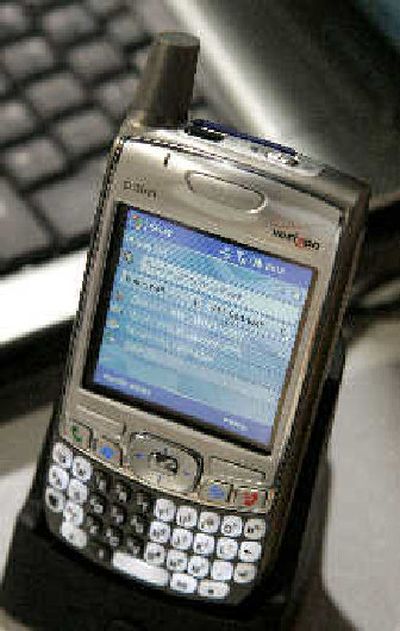BlackBerry rivals see their chance

Research in Motion Ltd. has been so successful that it has given new meaning to a word previously associated only with fruit. The firm’s BlackBerry device dominates the rapidly growing market for on-the-go business communications.
But over the next year, BlackBerry’s competition will get a lot tougher. Microsoft Corp. is making a major push into the software side of mobile e-mail. Meanwhile, a lot of new hardware is due to hit the market.
Palm Inc., BlackBerry’s biggest hardware competitor, will launch an updated model of its popular Treo, one that will run for the first time on Microsoft software. And BlackBerry rivals are in the offing from Nokia and Motorola, the world’s two biggest makers of mobile phones.
All three will join a Hewlett-Packard iPaq mobile device that went on sale through Cingular Wireless last fall.
Their timing couldn’t be better: RIM is locked in a legal battle with NTP Inc. over patents, a fight that has threatened to shut down the BlackBerry e-mail system.
Such a court-ordered shutdown is unlikely. But it has created uncertainty for RIM’s customers, and thus opportunities for competitors.
“It’s giving competitors an instant foot in the door,” said Brian Modoff, a stock analyst at Deutsche Bank Securities in San Francisco.
Indeed, Good Technology, probably RIM’s biggest competitor on the software and service side of the business, has fielded more than a hundred calls over the past couple of weeks from anxious BlackBerry customers, said Danny Shader, Good’s chief executive officer.
“We’re sort of everybody’s contingency plan,” he said.
Shader noted, too, that his California company is buoyed by the scheduled launch this winter of Motorola’s Q and Nokia’s E61. Both devices feature QWERTY keyboards and are aimed at BlackBerry users.
Good’s e-mail system runs on mobile devices made by several manufacturers: The more non-BlackBerry devices in the market, the better for Good.
RIM has historically packaged its BlackBerry with its own e-mail system, a proprietary network of servers and operations hubs.
With competition growing, though, RIM has been licensing its system to mobile phone-makers, including Motorola. The first non-BlackBerry device in this country to run on RIM’s network, the Nokia 9300, was launched in November.
Waterloo, Ontario-based RIM, which declined to comment for this story, basically built the mobile “enterprise” market, or wireless communications targeted at businesses.
For the most part, RIM’s devices are sold to companies, which parcel them out to employees. Employees can access their work e-mail from the road along with using their BlackBerries as phones.
As in any business, success breeds competition.
“This is a market a lot of people want to be in,” Bollin said.